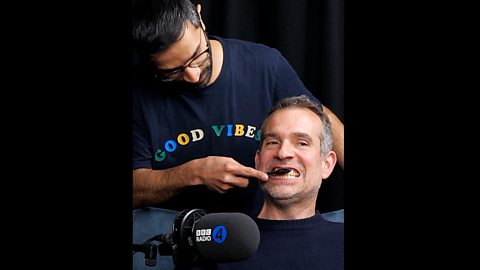Worried you don’t always have fresh breath? Here’s how to fix it
Do you avoid getting close to people because you’re worried your breath smells bad? Fear not, it’s a common concern and there are solutions.
On the What’s Up Docs? podcast, Chris and Xand van Tulleken explore the causes of bad breath, also known as halitosis, and find out what we can do about it.
Listen to the fresh breath episode of What's Up Docs?

What causes bad breath?
An astonishing 50% of adults in the UK have a form of gum disease, known as periodontitis, one of the major causes of bad breath.
“You can think of bad breath coming from the oral cavity or problems in the oral cavity. And that'll be probably 90% of bad breath,” says Dr Praveen Sharma, Associate Professor and Honorary Consultant in Restorative Dentistry. “10% will be systemic disease manifesting as bad breath. So you have people with poorly controlled diabetes, patients with gastrointestinal problems.” Bad breath can also come from eating a low carbohydrate diet, which can produce a sour breath.
Keeping your teeth clean is a battle with the bacteria which gets into crevices between our teeth and gums, into the niches of our tongue and coats the tooth, gums and roots. If we don’t get rid of it, this film of bacteria can take hold, eventually leading to serious gum disease. However, if you intervene through regularly brushing your teeth correctly, preventing bacteria from accumulating, you can avoid the onset of gum disease and help keep your breath fresh.
Six tips for keeping it fresh:
1. Get to the root of the problem
When you don’t clean away the bacteria that settles in the gaps between your teeth and gums, this leads to micro ulcers, which in turn leads to bleeding gums. The good news is that this early stage of gum disease, called gingivitis, is reversible. Check for your gums looking red, swollen or bleeding when you're brushing, but don’t be alarmed, you still have time to act.
The impulse may be to avoid brushing areas that are bleeding or sore but in most cases, this will subside as you master the correct brushing technique.

2. Brush mindfully
Most right-handed people will instinctively spend more time brushing the left-hand side and vice versa and as a result, if a person develops disease, they may have more inflammation on the side they pay less attention to.
Be mindful of whether you are right or left-handed and make a conscious effort to brush your teeth evenly on both sides, spending the same time on each side.
3. Master your brushing technique
Have a system when brushing and don’t rush it. Remember that each tooth has three surfaces: outer, biting, and inner, and all need thorough cleaning. It may come as a surprise to many, but two minutes is the minimum length of time to clean your teeth.
Many people use a scrubbing motion with the toothbrush at ninety degrees to the tooth, but this can generate overzealous brushing, causing gum recession. Remember it’s all in the action. Whether you've got an electric toothbrush or a manual one, use small circular motions.
Hold the toothbrush at a forty-five-degree angle to the tooth and brush in a gentle movement. Try to angle your bristles down into the gums for the bottom teeth and up into the gums for the top teeth, to remove bacteria hiding below the gum line.

How to brush your teeth
Dr Praveen Sharma demonstrates the best method for cleaning your teeth.
4. Brush at the right time of day
Many of us may have been taught to brush our teeth after meals. Think again. The acidity in food softens the protective enamel on the surface of the tooth and the dentine which lies underneath, so brushing straight after a meal can damage your tooth enamel.
Either brush your teeth before a meal, then afterwards rinse your mouth with water, or if you prefer, wait half an hour after a meal, during which time your saliva will act to neutralize the acidity of the food. Then you can brush your teeth.
While brushing your teeth twice a day for two minutes is ideal, brushing your teeth properly once a day may be adequate for some people. Your saliva flow decreases when you go to sleep so bacteria can do more damage to your teeth overnight. Therefore if you’re going to choose one time of day to clean your teeth thoroughly, evening is best.
Fit your habits with other activities - so for example, I get up, I brush my teeth, I go to bed, I brush my teeth. This will make it easier to form a routine around brushing your teeth.
5. Think like a workman and choose the right tools
Use a toothbrush with medium stiffness bristles. Get into the habit of also using interdental brushes of bristle or rubber. This will help clear out the bacteria between the teeth and gums.
Whatever toothpaste you choose, make sure that it has fluoride in it because this strengthens tooth enamel, making it more resistant to decay. Mouthwash is worth using if you have early signs of gum disease because it will help reduce the build-up of plaque and bacteria.
6. Recognize serious gum disease
If periodontitis progresses, you'll start to notice that gaps may appear between the teeth, and as the bone holding the tooth starts to erode, they might become wobbly. If left unchecked, then you'll get to a point where the bone loss is so severe that the teeth could fall out. You may have persistent bad breath. If these symptoms are present, contact your dentist immediately.
And finally, a few more quick fixes to help freshen up your breath:
• Try to keep hydrated because if your mouth is dry, bacteria can thrive
• Clean your tongue with a tongue scraper. This removes food particles, bacteria and dead cells, all of which can lead to bad breath
• If in doubt about how fresh your breath is, give a friend or family member the job of checking. Just remember to choose carefully!









